Complete Guide to Hotel Dynamic Pricing and How it Works
Markets in the hotel industryconsistently fluctuate because of changes in supply and demand, usually because of...

Table of Contents
Robots, advanced machine learning, and intelligent computer systems are just some of the innovations invented and established thanks to Artificial Intelligence.
In the past, automated reports and analytics were almost impossible, today, your hotel business could shut down without the help of AI.
Artificial Intelligence is already contributing to increased economic growth in the hospitality industry. Moreover, not leveraging AI hotels can give your competitors that do use AI hotels technology an advantage over you, which can significantly affect your hotel’s profitability.
This article provides an in-depth guide on artificial intelligence, its benefits to the hotel industry, and current and future trends hoteliers must look out for to help their business stay afloat.
Artificial Intelligence is computer technology that allows applications, programs, and systems, including hospitality technology, to make informed decisions using data.AI in hotels consists of the following technologies:
Hotels utilizing AI technology are poised to become front-runners in the industry. Some hotels, like the Henn-na Hotel in Nagasaki, Japan, are entirely staffed by robots that run off of intelligent AI systems, and are able to provide general information, check-in and check out, answer questions, and more.
But AI hotels aren’t just about customer service. Artificial intelligence in hotels can also mean more effective revenue management. For example, HouseCount RMS utilizes machine learning technology—called Feedback Theory—to provide transparent, flexible, and accurate pricing recommendations for all of your properties based on current and historical data. HouseCount is also fully mobile, so you can be productive while you’re on the go.
Automating daily operations is another way that AI in hotels is making the industry more efficient. By reducing potential human errors, and tasks by automating repetitive and tedious tasks, hoteliers can focus on higher-value tasks and customer service. Of course, to take full advantage of the benefits that AI hotels technology has to offer, hotel revenue managers must properly budget a hotel’s resources and invest in the right AI hotels tools for the business’s overall growth.
The primary reason why artificial intelligence plays a significant role in the hotel industry is because of its ability to perform tedious and repetitive tasks more efficiently and accurately compared to people. This allows hotel owners to save money, deliver top-notch service, and reduce potential human errors.
Artificial intelligence can also significantly improve customer service, which is critical in the hospitality industry. At the end of the day, the goal of hotels should be satisfying their clients to make them loyal to their brand. AI can create better personalization tailored to the wants and needs of different types of customers.
AI can also help address common customer questions, giving hotels the ability to provide effective customer service even during off hours. Using the information gleaned from AI interactions, the system learns and improves, meaning the quality of interactions becomes better over time.
But probably one of the most important applications for AI in hotels is dynamic revenue management and upselling. Given the wide variety of moving parts that need to be considered with price setting, manual price management just isn’t fast, efficient, or accurate enough to remain competitive. Even smaller hospitality properties have to contend with pricing differences on various booking websites that dominate the internet.
AI hotels technology can help by performing automatic number-crunching to determine the best price for rooms, events, and facilities through high-level and granular analysis based on historical and current data.
For instance, HouseCount RMS provides:
Data analytics provided by AI hotels software also involve the following aspects:
AI can help you create guest classifications based on their desired amenities, available budget, room preferences, and other factors.
The increased importance of artificial intelligence is mainly because it provides better customer service and efficiency throughout a hotel’s operations. Let’s look at the primary benefits of this innovation among hotels below.
Utilizing automation and integrating it within your current business ecosystem can improve your company’s overall efficiency. An AI-driven property management system can potentially increase your profitability and streamline your property’s revenue management.
For instance, the property management system provides holistic views of the hotel’s profits and expenses that can help track your business cash flow. And because it’s AI-driven, you can expect faster monitoring of current market trends, helping you get the best rates to boost your room occupancies.
AI-driven property management systems (PMS systems) also promote more accessible communication with your online travel agency channels. Ultimately, AI can skyrocket your hotel revenue without requiring excessive efforts from your human task force.
Artificial intelligence is all about enhancing customer experience so that customers provide positive feedback and will stay with you again. Artificial intelligence allows for personalization and tailored recommendations based on different customer types. AI-driven tools can record and identify customer preferences more easily and efficiently than conventional programs and applications.
Some of the data you can achieve that involves customer feedback with AI include the following:
And because you have all the information you need to learn more about customer experiences, you can curate better services that will improve their stay the next time they book your hotel. Moreover, AI can also upsell your property by providing additional purchase options.
Thanks to AI and other digitization tools, providing better and more efficient assistance to your guests is now possible. Chatbots are the new norm, allowing hoteliers to attend to more guests simultaneously.
These AI-driven tools take care of online queries, relieving pressure and hassle from your front desk. Chatbots also allow your employees to accomplish more valuable tasks that can improve daily operations.
AI also has something to do with self-check-in kiosks. This totally eliminates tedious and hassle check-in routines, which can significantly take up your customers’ time.
Today, hotels that establish their global footprints receive more loyal customers and increase their visibility. But if you want to create a name worldwide, adapting to the local language of your clients is critical. This helps break any communication barrier that can negatively affect your international guests’ experience.
Intelligent chatbots with generation and natural language processing tools can communicate with your local customers in the language they can understand.
The truth is, AI is consistently changing the name of the game as it significantly improves the guest experience.
Artificial intelligence is expected to streamline and generate the following aspects of a client’s on-property satisfaction:

Hotel chatbots are the fastest and most efficient way to get to your customers’ frequently asked questions about your hotel, its booking experience, amenities, and other aspects.
Generally, hotel chatbots are rule-based or AI-generated, and their responses rely on existing knowledge and learning algorithms.
|
AI Chatbot |
Rule-based Chatbot |
|
Generated by deep learning |
Keyword-driven |
|
Understand various ways in which humans can relay their queries |
Act on manually-crafted rules |
|
Learns from real-life interactions |
Meticulous training is necessary |
|
Understands abbreviations and spelling errors |
Difficult scalability |
|
Rely on historical data to improve responses |
The constant need to update |
Basically, chatbots are like virtual booking assistants that can operate well, especially when guests inquire about the frequently asked questions about your hotel’s overall experience. They should naturally have all the information your guests need that can help manage their expectations before setting foot at your hotel.
Chatbots can appear in the following ways:
AI-driven chatbot utilize natural language processing. Because they are automated, they can understand human questions and learn to trigger the response your guests are looking for.
Additionally, AI chatbots can learn from each new interaction, increasing the chances of improving how they can help drive more hotel bookings.
So, what’s the primary benefit of utilizing an AI chatbot for your hotel business?
The answer is simple—driving a more significant customer base, thanks to new customer interactions from AI-driven chatbots.
AI chatbots can comprehend and understand real language. This allows them to respond and react more relatable and conversationally, promoting better accuracy. These innovative tools can also connect and associate with other services and technologies, including:
AI chatbots can also provide more individualized assistance to your guests. Depending on their preferences, they can create suggestions or recommendations on what service or activity your customers can try. This creates a more remarkable experience for your guests.
Adapting various AI examples in your hotel businesses can help you stay ahead of your competition.
On top of that, you can also guarantee boosted sales, more efficient hotel operations, and enhanced guest experiences.
The following are the most common examples of utilizing artificial intelligence in hotels.
AI-driven concierge services can provide seamless check-in and check-out, answer queries 24/7, and order room service. Moreover, guests can request these simply by texting or messaging using their mobile phones. An example would be Edward, an AI concierge at Radisson Blu Edwardian in Manchester and London.
Hotel chatbots can consistently enhance guest experience and relieve your front desk staff, allowing your employees to ensure they provide top-notch service to guests physically present.
Another example is allowing AI to analyze customers' behavior and attitudes about your hotel. AI-driven sentiment analysis can track millions of conversations regarding your hotels and analyze how your guests feel about your business's specific features and services.
Hyperdynamic pricing is an AI-driven tool that helps online booking engines monitor past user data, search social media, and track the world news that can display better rates to drive better earning potential.
For instance, when the AI software automatically detects a large conference booking nearby hotels, it can adjust your hotel prices immediately because of increased demand. This kind of dynamic pricing helps you stay competitive and ultimately leads to revenue maximization.
As previously mentioned, artificial intelligence significantly improved revenue management. It helps revenue managers monitor and predict data to generate reports that can establish a room’s optimized pricing plans and identify the best channels where you can advertise your property.
AI-driven revenue management tools can determine which distribution channel can help you reach different customer segments to get the most out of your occupancy, revPAR, and overall revenue.
Customer opinions, thoughts, and feelings matter. In fact, it’s critical to listen to what your guests say so you know what and how to improve.
We know manually reviewing them online in channels like TripAdvisor and Yelp means more time wasted. Why not utilize AI to do it all for you? Machine learning is a subset of artificial intelligence that can gather, store, track, and analyze all necessary data across all your hotel’s online sources.
Artificial intelligence presents robust solutions for optimizing product placement strategies. Through the fusion of geolocation data and predictive algorithms, hotels can furnish immediate suggestions to their guests, frequently utilizing mobile applications.
The examination of historical data using algorithmic processes allows for a comprehensive grasp of guest inclinations, enabling the formulation of personalized recommendations.
While artificial intelligence provides the automation hotels need to perform tasks more efficiently and reduce human errors, it can never replace your hotel staff.
This is simply because artificial intelligence does not have the human capacity and real intelligence to draw man-like conclusions and justify wise choices based on available data.
Moreover, AI cannot think critically. It cannot develop new theories based on customer insights. Plus, it does not know anything about empathy, a significant consideration in relating with your guests and improving customer service.
Ultimately, human involvement is still a critical factor for hotels. AI supports your staff and relieves them of repetitive tasks that can be accomplished through automation faster and more efficiently.
Artificial intelligence is never a substitute for any human interaction.
But it can genuinely streamline workflow operations that can help your staff generate more ways to improve the overall guest experience.
When considering AI and utilizing it for your hotel, it’s important to stay aware of its risks and challenges that can affect your business. Let’s name a few.
Remember that implementing AI-driven tools can be expensive, which can limit your resources, especially for smaller hotels. It can also be challenging to train your hotel staff and get them up-to-speed in using AI-driven systems.
Not all AI-powered tools can integrate seamlessly with business ecosystems. You must check with your team and check whether artificial intelligence can work well and is compatible with your current tech stack, including cloud storage, property management systems, etc.
Artificial intelligence can also cause hotel managers to rely on technology too much. This can become a problem when network issues, system failures, and other technical glitches arise, which human empathy cannot solve.
Problems with new technology can also negatively impact your hotel’s overall productivity. And this means bad business for your guests.
Artificial intelligence will continuously evolve in the hospitality industry. And because its growth is expected to increase exponentially in the coming years, hoteliers and revenue managers must be aware of the future trends:

Hotels utilize the power of Artificial Intelligence software to revolutionize the hospitality landscape.
These cutting-edge AI hotels tools are designed to enhance operational efficiency, streamline guest interactions, and provide unparalleled personalized experiences.
By seamlessly integrating AI into their operations, hotels set new standards for guest satisfaction and operational excellence. Here are reputable AI software solutions you can utilize for your business:
|
AI-Driven Software |
Features |
|
Luxe Pricing: HouseCountRMS & LuxSell URS |
|
|
Oracle Hospitality |
|
|
SkyTouch Technology |
|
|
Volara |
|
|
uHotelBooking |
|
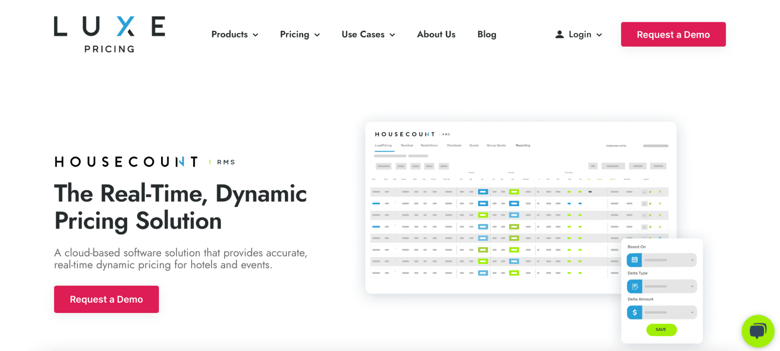
HouseCount RMS is a cloud-based pricing solution that can provide accurate and real-time dynamic pricing strategies for your hotel. By monitoring and analyzing market trends and past user satisfaction, this software can establish robust pricing recommendations to help your property stay ahead of your competitors.
HouseCount RMS can also help maximize your hotel revenue by boosting occupancy. With its fully-mobile software solution, anyone can access it, especially when they need significant data that can help them improve the guest experience.
This AI-driven software solution also promotes seamless integration with your current business ecosystem, preventing any tech challenge that can affect your hotel’s overall productivity.
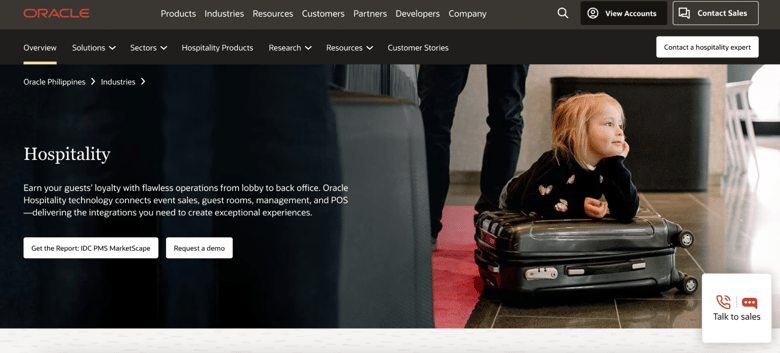
The Oracle Hospitality OPERA Property Management System (PMS) is a widely used software solution designed to streamline and optimize hotel operations. It offers a comprehensive set of features to manage various aspects of a hotel's daily activities and guest interactions.
Oracle’s Reservations Management allows hotels to manage room reservations, guest profiles, and availability in real time. Front desk staff can efficiently check room availability, rates, and occupancy to facilitate smooth check-in and check-out processes.
OPERA PMS also maintains detailed guest profiles, storing information such as contact details, preferences, stay history, and special requests. This enables personalized service delivery and enhances guest satisfaction.
OPERA PMS offers multi-property management capabilities for hotel chains or properties with multiple locations. This allows centralized control and reporting across different properties.
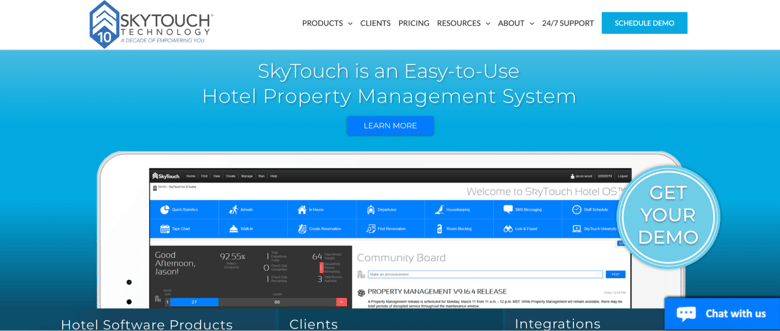
SkyTouch Technology provides cloud-based property management system (PMS) solutions specifically designed for the hospitality industry. Their platform offers a range of features and tools to help hotels and other accommodation providers manage their operations efficiently.
The PMS assists with core front desk tasks, including guest check-in and check-out, room assignments, and managing guest requests. It provides an intuitive interface for front desk agents to efficiently handle guest interactions.
Additionally, SkyTouch enables efficient housekeeping management by providing real-time room status updates to the housekeeping staff. This ensures smooth turnover and helps maintain a high level of cleanliness.
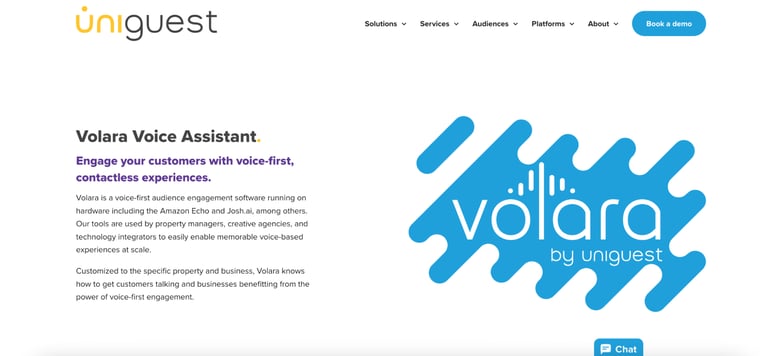
Volara provides voice-based guest engagement solutions designed for hotel businesses. Their platform focuses on integrating voice technology, like Amazon Alexa and Google Assistant, into hotel rooms to enhance guest experiences and streamline hotel operations.
Volara enables guests to control various in-room amenities and services using voice commands. Guests can use voice to adjust room temperature, control lighting, request room service, or inquire about hotel information.
Hoteliers can also customize Volara’s solutions to match the branding and specific services of the hotel. This ensures seamless integration of voice technology into the hotel's existing systems and offerings.
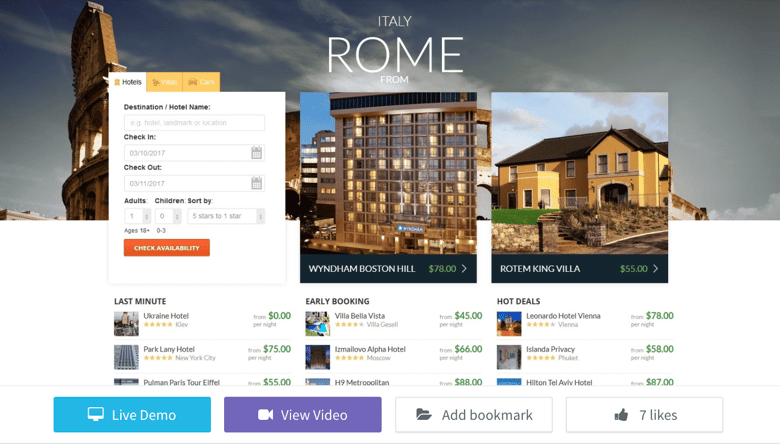
uHotelBooking is an online booking system designed for hotels, resorts, and other accommodation providers. It offers a range of features to help manage reservations, room availability, and other aspects of the booking process.
The system typically offers tools for managing room types, inventory, and availability. Hotel administrators can easily update and track room occupancy and allocations. The platform also often includes an availability calendar that displays room availability for different dates. This helps guests choose suitable dates for their stay.
Many implementations of uHotelBooking feature a responsive design that adapts to different devices and screen sizes, ensuring a smooth booking experience on mobile devices as well.
The impact of Artificial Intelligence on the hospitality industry, particularly in hotels, has been transformative and continues to shape how hotels operate and engage with guests. AI technologies have established enhanced guest experiences, streamlined operations, and data-driven decision-making.
From personalized guest interactions facilitated by AI-powered chatbots to dynamic revenue management driven by predictive analytics, Artificial intelligence has also enabled hotels to deliver tailored services that resonate with individual preferences, creating memorable stays and fostering guest loyalty.
As the hospitality industry evolves, AI's role will grow, enhancing guest satisfaction and improving revenue management. However, the human touch remains essential, and finding the balance between AI-driven automation and personalized human interaction will be crucial for hotels to provide a holistic customer experience.
Schedule a demo with Luxe Pricing today and learn more about the AI-driven tools in HouseCount RMS.

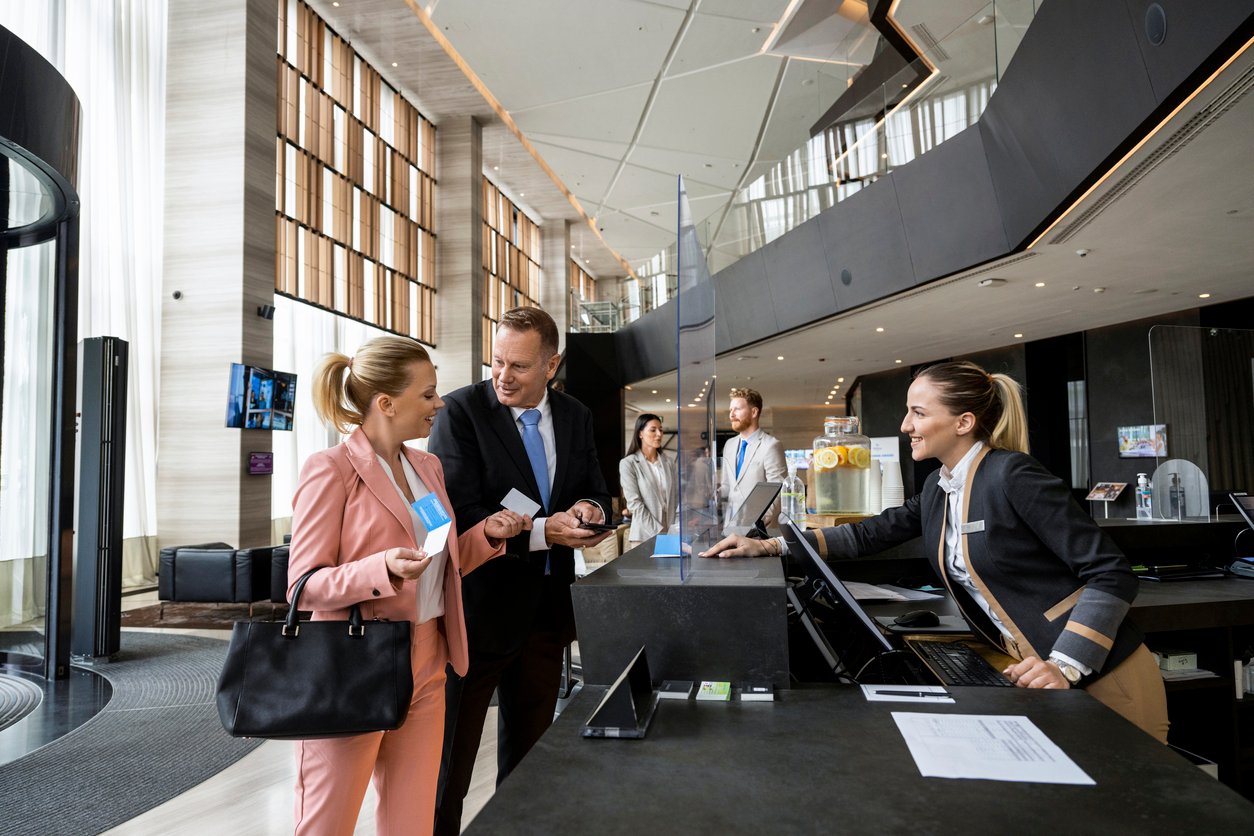


Get Hooked! Sign Up to get the latest catch sent to your inbox.
Markets in the hotel industryconsistently fluctuate because of changes in supply and demand, usually because of...
Hotels have several departments running different operations. So, what’s the best way to keep tabs on everything that’s...
According to a recent study, around 58% of businesses implementing emerging technologies have been able to grow their...